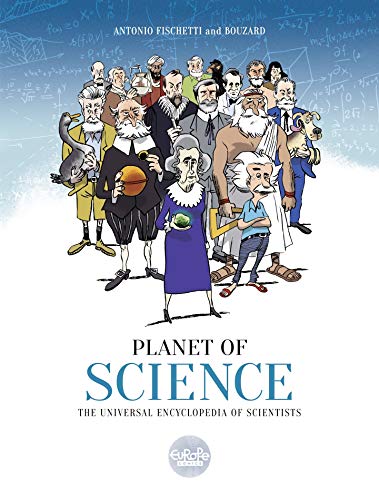
By Antonio Fischetti & Bouzard, translated by James Hogan (Europe Comics)
No ISBN: digital only
Win’s Christmas Gift Recommendation: Celebrating Humanity’s Greatest Miracle – Science! … 8/10
I saw this and thought of you…
Comics and graphic novels have an inconceivable power to deliver information in readily accessible form, and – like all the best teachers – can do so in ways that are fascinating, fun and therefore unforgettable.
A paradigm example is 2019’s La Planète des sciences – Encyclopédie universelle des scientifiques – which is now available digitally in English if not yet as a solidly reassuring tome. A bright and breezy introduction to a number of researchers and discoverers famed and not, it combines a page of personal history, biography and unflinching commentary on 37 notable personages who have added to global scientific knowledge, each accompanied by a smart, punchy and pertinent gag strip by underground cartoonist Guillaume Bouzard (Caca bemol, JeveuxtravaillerpourleCanardEnchaîné, Lucky Luke).
Presenting the facts is Dr Antonio Fischetti, author (Cats and Dogs under the scientist’s magnifying glass, Idiotic and Relevant Questions about Mankind); science journalist; educator (at the National Conservatory of Arts and Crafts, National Conservatory of Music and Dance in Paris, Louis-Lumière School and La Fémis); and author of a weekly science column for Charlie Hebdo.
The Continent is happily awash with factual albums and graphic novels – and not just biographies – and this is one of the most entertaining I’ve seen in years, opening with Dr. Fischetti’s explanatory postulate on why these particular 37 candidates and his cognitive methodology, before the visual revelations begin.
Divide into rough, ofter overlapping time frames it all starts in Ancient Greece with the lowdown and high points of Thales, Pythagoras, Hippocrates and Archimedes, before jumping to 780-850 for the story of Al-Khwarizmi.
Spanning the 15th – 16th Century, we meet Leonardo da Vinci, Nicolaus Copernicus, Ambroise Paré, Giordano Brunoand Galileo, before 17th – 18th Century pioneers Réne Decartes, Antonie van Leeuwenhoek, Isaac Newton, Carl Linnaeus and Antoine Lavoisier get their moment in history’s hindsight and spotlight.
Representing the 19th Century are Charles Darwin, Claud Bernard, Gregor Mendel, Louis Pasteur, Alfred Nobel and Dmitri Mendeleev after which the revolutionary 19th – 20th Century hones in on Ivan Pavlov, Max Planck, Marie Curie, Albert Einstein, Alfred Wegener, Alexander Fleming, Erwin Schrödinger and Trofim Lysenko. By now its probably clear to most of you that this is no simple hagiography: same of the folk here are here because of their effect on scientific progress and it’s not all smiles, acclaim and awards…
The procession ends with the 20th – 21st Century (because, as of this writing, time travel has not been satisfactorily confirmed or reproduced under laboratory conditions) with controversial and occasionally still-living paragons Konrad Lorenz, Alan Turing, Alexander Grothendieck, James Watson, Peter Higgs, Yves Coppens, Jane Goodall and Emmanuelle Charpentier. Sure, you could Google them, but this book is a far more satisfying alternative…
The very fact that you probably haven’t heard of some of these latter savants – or even a few of the more ancient ones – only proves without doubt, that you need this book. QED: What more can I say?
© 2020 DARGAUD – Fischetti & Bouzard. All rights reserved.
